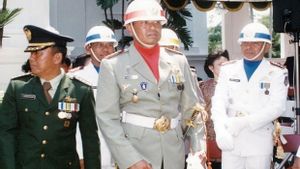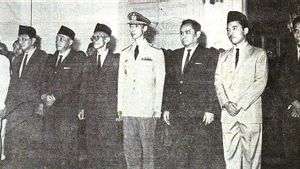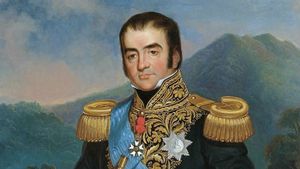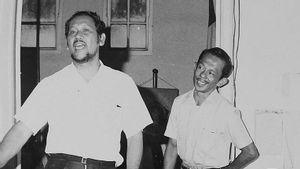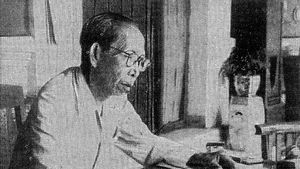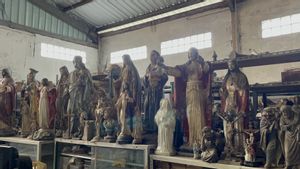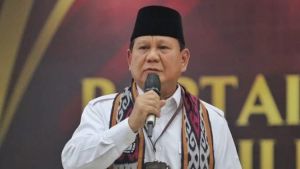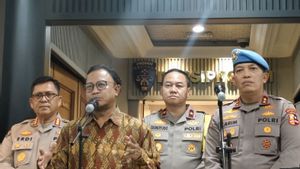JAKARTA Memori hari ini, 42 tahun yang lalu, 20 Agustus 1981, Kiai Haji (KH) Muhammad Syukri Ghozali menjabatkan sebagai Ketua Umum Majelis Ulama Indonesia (MUI). Ia kemudian tercatat sebagai Ketua MUI ke-2 sepanjang sejarah perjalanan MUI.
Previously, the first leadership of the MUI was held by Buya Haji Abdul Malik Karim Amrullah (Hamka). Hamka's leadership is full of dynamics. He did not want the MUI to be driven by the New Order (Orba) government. Fatwa matters, let alone. This association made Hamka choose to withdraw from MUI.
The New Order (Orba) government often views Buya Hamka as a famous cleric. This admiration made Hamka asked as the first MUI chairman in history in 1975. New Order sees Hamka as having that capacity.
Instead of saying that Hamka was only able to unite the people of Muhamadiyah, he was actually seen as capable of uniting all Muslims in Indonesia. The New Order began to ask Hamka to help regulate Muslims. Buya Hamka agreed.
In fact, it is far from wild. The effort to regulate what the New Order means is so that MUI acts as the government's mouthpiece. Hamka strongly rejects that desire. Buya Hamka does not want to be regulated by the government. Moreover, Islamic affairs.
Buya Hamka's attitude was stated when the New Order wanted to celebrate Eid al-Fitr and Christmas simultaneously in offices in 1981. Buya Hamka firmly rejected the proposal. This is because Buya Hamka adheres to Muslims who are prohibited from attending and participating in Christmas rituals together.
It is not forbidden to wish Christmas and other non-trial activities. He considers religious affairs not a joke. Hamka also issued a fatwa that contained a prohibition on Muslims from participating in Christmas services together. The presence of the fatwa caused a stir.
The New Order also continues to urge Hamka to revoke the fatwa. Hamka didn't want to. He remained at his establishment. Hamka also chose to withdraw from the MUI rather than having to revoke the fatwa. This attitude made him officially leave the MUI on May 19, 1981.
When the MUI issued its legal fatwa for Muslims to participate in the Christmas celebration together, the government objected to the fatwa. Because it was against the government, the father then took a firm brush, declaring his resignation from the position of Chairman of the Central MUI.
After news broke that my father had taken the decision to resign from the General Chairperson of the MUI, many Islamic figures congratulated my father for this firm attitude. Including the preacher who always blasphemed my father. While embracing his father, he apologized for his attitude so far," said Buya Hamka's son, Irfan Hamka in his book: Buya Hamka's Story (2013).
Buya Hamka's resignation made the position of MUI leadership vacant in a few months. The chair was then filled again on August 20, 1981. Nahdlatul Ulama (NU) figure, Syukri Ghozali was then asked by acclamation as the new MUI leader at the MUI Plenary Session on the lower floor of the Istiqlal Mosque.
The selection of Syukri Ghozali was considered the right person. Moreover, previously Syukri Ghozali was also praised by the late Buya Hamka who died on July 24, 1981. Hamka said that the leadership of Syukri Ghozali was acceptable to all parties. The cleric is considered to be able to unite the large mass organizations of Muhammadiyah and NU Islam.
His leadership has made MUI actively issue fatwas related to the interests of Muslims. Mainly, the flow affairs are considered to deviate from Muslims.
VOIR éGALEMENT:
Before Syukri was elected, the names mentioned as candidates for general chairman: former Minister of Religion, Mukti Ali, Deputy Speaker of the Indonesian House of Representatives, Masykur, Hasan Basri, EZ Muttagin, apart from Kiai Syukri himself. But finally a solution was obtained. Because, especially after Hamka died in the last month of Ramadan, other figures began to appear.
Like the saying of the saying of Muttaqin: While the moon is still shining, the stars do not look brilliant. But after the moon is covered with clouds, the stars appear to shine. And Kiai Syukri is indeed a star that is quite striking among other stars, written in a report in Tempo Magazine entitled A Star Behind the Clouds (1981).
The English, Chinese, Japanese, Arabic, and French versions are automatically generated by the AI. So there may still be inaccuracies in translating, please always see Indonesian as our main language. (system supported by DigitalSiber.id)



